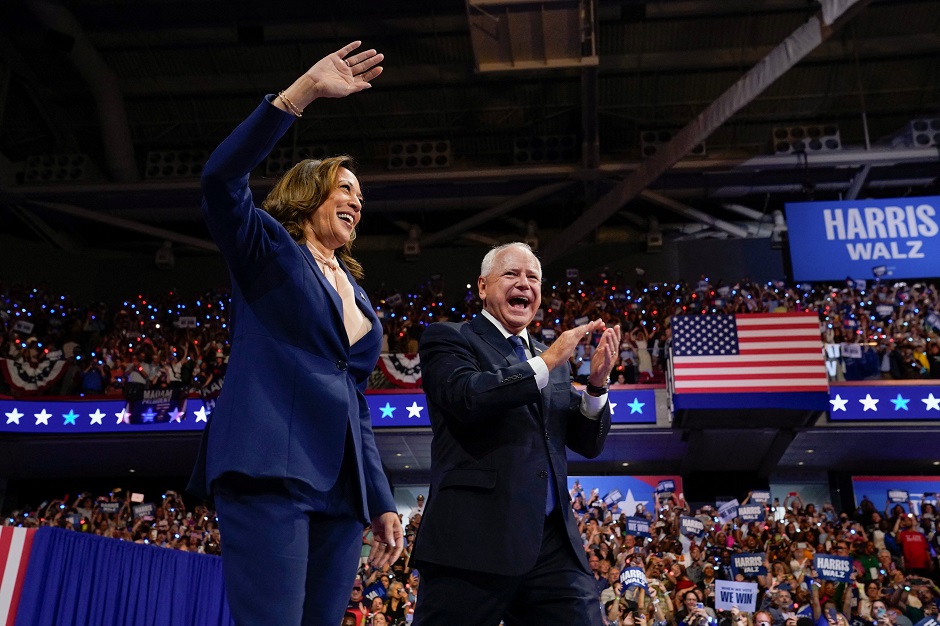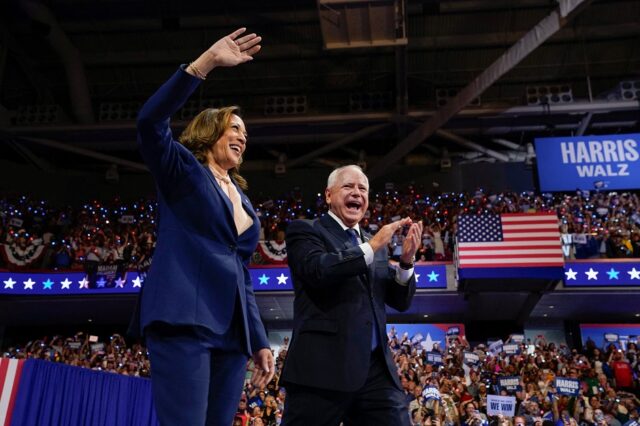

WASHINGTON — When this year began, Gov. Tim Walz’s election as the new head of the Democratic Governors Association set him on a course to raise his profile – but who knew he would be at the center of the biggest political story of the year?
Walz began 2024 focused on duties typical of a Minnesota governor: naming judicial appointments, announcing a new state infrastructure plan and naming the eight winners of the 2023-24 Name a Snowplow contest.
The governor had problems, sure. He had to deal with the fallout of the $250 million “Feeding our Future” scandal, in which dodgy nonprofit groups claimed to distribute meals to schoolchildren during the pandemic. Instead, more than two dozen people involved were convicted or pleaded guilty to charges including fraud, bribery and money laundering.
Walz also had to defend state spending that could lead to a future budget deficit and was concerned the DFL might not be able to hang on to its majorities in the state Legislature.
But he faced a unique challenge in July when a group of Democratic governors wanted to meet with President Joe Biden to discuss concerns about the president’s rocky debate performance with Donald Trump.
As head of the DGA, Walz was in charge of trying to arrange a meeting between the governors and Biden, who had not reached out to those Democrats as concerns about the president’s health escalated.
Some of those governors, like Maryland’s Wes Moore and Rhode Island’s Dan McKee were Biden boosters. But others, including California Gov. Gavin Newsom and Michigan’s Gretchen Whitmer, had been floated as potential presidential candidates themselves.
Walz walked out of the meeting with Moore and New York Gov. Kathy Hochul, another Biden ally, and claimed all was well.
“Yes, fit for office,” the governor said in response to a question from a reporter, tamping down Democratic fears about Biden’s ability to lead the nation.
‘A knucklehead’
Walz’s calming of the political waters became a turning point in his political career. How he handled the sensitive visit to the White House was appreciated by the Biden-Harris campaign team – and it put him on the radar when Biden decided he would not seek a second term.
There were plenty of good VP candidates Vice President Kamala Harris, who replaced Biden at the top of the Democratic ticket, could have chosen as running mates, especially Pennsylvania Gov. Josh Shapiro, Kentucky Gov. Andy Beshear and Arizona Sen. Mark Kelly.
In fact, Las Vegas bettors gave Walz low odds at becoming the Democratic vice presidential pick.
But no one campaigned harder than Walz. He took to social media and cable news shows. Americans who had never heard of him warmed to his Midwesternisms and his interactions with his daughter Hope, who became an internet star in her own right.
Walz also came up with a popular insult to Donald Trump and his camp, calling them “weird” and boosting his candidacy as an effective communicator.
Walz’s Midwestern roots and his progressive record as governor also had an appeal to the new Harris for President campaign. Eventually, after what was characterized as a successful interview with Harris, Walz got the job.
That’s when his political and personal life zoomed in a totally different direction.
No longer would Walz spend his days on the more predictable job of governing Minnesota. Now he was on the national stage, giving stump speeches across the country and enlisting his wife, Gwen, and daughter Hope to help during a compressed campaign for the White House.
He also drew white-hot media attention, which resurrected his misstatements about his rank when he retired from the National Guard, the fertility treatments he and Gwen used to conceive their children and the timing of his visit to China’s Tiananmen Square (he was not there during a military crackdown on protesters, as he has said.)
Under pressure during his debate with Sen. JD Vance, Walz called himself a “knucklehead” for his misstatements.
Redlines for Trump
The governor was deployed to reach out to small-town and rural America, and try to connect with male voters who were cool to Harris.
Gwen Walz also proved to be adept at giving political speeches. Like her husband, she deployed to key swing states that would decide the election.
But the furious effort to win the White House failed, and Walz is now back home working out of the State Capitol in St. Paul.
He has joined a long list of losing vice-presidential candidates, a list that includes Teddy Roosevelt, Walter Mondale, John Edwards, Sarah Palin, Paul Ryan and Tim Kaine. Most never won a national election after their attempt to become vice president.
Walz was philosophical after his loss, saying the campaign gave him a good tour of the nation. But he also said he was “a little surprised” Americans rejected the Harris-Walz ticket.
“It felt like at the rallies, at the things I was going to, the shops I was going in, that the momentum was going our way,” Walz told Tom Hauser of KTSP-TV earlier this month. “And it obviously wasn’t at the end of time.”
In an interview with MPR News, he also rued why he, the least wealthy candidate for vice president, did not connect with voters who preferred Trump.
“I thought it was a real flex when the Wall Street Journal pointed out that I might have been the least wealthy person to ever run for vice president,” Walz said on MPR. “And I thought that would be something people say, ‘Well, this guy knows where we’re coming from. He’s had to pay his bills, he had to and still does.’”
Walz, who had to leave his job as the head of the DGA when he became a vice-presidential candidate, is now one of the 23 Democratic governors who will, in one way or another, be forced to contend with Trump’s agenda, which is likely to clash with their policies on health care, immigration, LGTBQ rights, education and other issues.
In that interview with MPR News, Walz said there are redlines where he would fight against the policies of a Trump presidency and a GOP Congress, including any that restrict abortion access or those aimed at ending vaccine requirements in Minnesota’s public schools
Will he run for reelection? Walz says he hasn’t decided yet.

Ana Radelat
Ana Radelat is MinnPost’s Washington, D.C. correspondent. You can reach her at aradelat@minnpost.com or follow her on Twitter at @radelat.
The post A 2024 lookback: Gov. Tim Walz’s very weird year appeared first on MinnPost.
















































